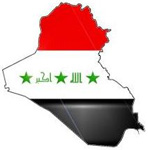 AFP: Nuclear talks between the major powers and Iran that are to be held in Baghdad on Wednesday have major implications for global security but also mark the latest step in Iraq’s emergence from isolation. By Prashant Rao
AFP: Nuclear talks between the major powers and Iran that are to be held in Baghdad on Wednesday have major implications for global security but also mark the latest step in Iraq’s emergence from isolation. By Prashant Rao
 BAGHDAD (AFP)— Nuclear talks between the major powers and Iran that are to be held in Baghdad on Wednesday have major implications for global security but also mark the latest step in Iraq’s emergence from isolation.
BAGHDAD (AFP)— Nuclear talks between the major powers and Iran that are to be held in Baghdad on Wednesday have major implications for global security but also mark the latest step in Iraq’s emergence from isolation.
For years, an international pariah and then racked by horrific bloodshed in the aftermath of the US-led invasion of 2003 that left tens of thousands dead, Iraqi authorities have earmarked more than $1 billion as part of wide-ranging efforts to boost the country’s profile, with mixed results.
“We are keen that Iraq takes on a role as a constructive, positive country that has a new character, different from the character established by Saddam Hussein, which was about looking for power,” said Ali Mussawi, spokesman for Iraqi Prime Minister Nuri al-Maliki.
“This meeting is an opportunity to showcase Iraq’s real face, as a country looking for stability and development. At the same time, I want to say that Iraq is not a marginal country — it is an important country, and it has a positive role.”
The talks, set for May 23, will see Germany join the veto-wielding permanent members of the UN Security Council — Britain, China, France, Russia and the United States — look to head off a dangerously escalating standoff over Iran’s nuclear programme.
Those talks are the latest example of Iraq pushing to host a variety of events to present itself to the world as a relatively stable country that is no longer rife with violence, but its attempts to do so have so far yielded uneven results.
While attacks remain common in Iraq, violence is sharply down from its peak in 2006 and 2007.
It did host a landmark Arab summit in March, the first such gathering to be held in Baghdad since now-executed dictator Saddam’s 1990 invasion of Kuwait, but much of the city was shut down and Iraqis complained of rising costs and little benefit to them from the refurbishment of upscale hotels and summit venues.
Plans for the Shiite holy city of Najaf to be the Islamic Capital of Culture this year, meanwhile, were cancelled amid rampant delays and allegations of misallocated funds.
Combined, the two events were allocated around $1 billion, with additional money earmarked for Baghdad to be Arab Capital of Culture next year.
Proposals for the southern port city of Basra to host the 2013 football Gulf Cup have also been shelved, as participating nations did not accept Iraq’s guarantees of safety.
Even for the Iran talks on Wednesday, initial concerns were raised by participating countries over Iraq hosting the event, both due to the violence of recent years and because of Baghdad’s close relationship with Tehran, whose nuclear programme is the focus of the talks.
“It was people who hadn’t been to Baghdad, who thought: ‘We’re going to a war zone’,” said a Western diplomat in Baghdad, speaking on condition of anonymity.
“It was just an initial reaction.”
The diplomat added, of the concerns over Iran’s influence on Iraq: “There was a tiny bit of that, but I think again, that’s just from a sort of fairly loose reading of regional politics.
“The Iraqis are not mediating, they’ve been very clear they’re not mediating. Every time, the first thing they say is: ‘We understand we’re not here as mediators’, just as the Turks weren’t mediators in Istanbul,” the diplomat said, referring to the last round of nuclear talks in April.
The Baghdad talks are not expected to produce spectacular results, so much of the focus will be on the fact that the Iraqi capital managed to host them at all.
“The sheer ability of Iraq to hold a major international event of this category highlights its re-emergence on both regional and international levels,” said Reidar Visser, an Iraq analyst and editor of the Iraq-focused www.historiae.org website.
“This follows the Arab League summit in March and comes at a time when the Iraqi capacity for increasing its oil (output) is receiving worldwide attention.”


